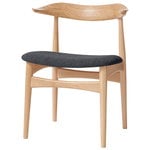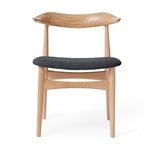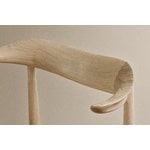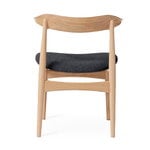Cow Horn chair, designed by Knud Færch in 1969, is a Danish design classic that has been re-released by Warm Nordic. Cow Horn got its name after the distinctive shape of its backrest, and the solid wood frame and upholstered seat complement its sophisticated appearance. Also known as the Model 521, Cow Horn is a fine example of Knud Færch’s love for sculptural shapes and woodworking traditions. Cow Horn chairs settle into groups by dining tables and add a playful touch to the interior also individually.




Cow Horn chair, oiled oak - anthracite
Warm Nordic
Description
Cow Horn chair, designed by Knud Færch in 1969, is a Danish design classic that has been re-released by Warm Nordic. Cow Horn got its name after the distinctive shape of its backrest, and the solid wood frame and upholstered seat complement its sophisticated appearance. Also known as the Model 521, Cow Horn is a fine example of Knud Færch’s love for sculptural shapes and woodworking traditions. Cow Horn chairs settle into groups by dining tables and add a playful touch to the interior also individually.
Product details (10)
- Colour
- White-oiled oak, anthracite melange
- Width
- 55 cm
- Depth
- 49 cm
- Height
- 74 cm
- Seat height
- 45 cm
- Frame material
- Oiled solid oak, veneer seat
- Upholstery fabric
- Kvadrat: Hallingdal 180, 70% new wool, 30% viscose
- Abrasion resistance
- 100,000 Martindale
- Pilling
- 3
- Lightfastness
- 7
- Product ID
Designer
Danish designer Knud Færch (1924-1992) made a career as a furniture designer in the 1950s and 1960s. A student of Finn Juhl, Færch created many distinctive pieces of wooden furniture, such as the Cow Horn chair.
View all productsReviews (0)
Sustainability
The Product Sustainability Framework, our criteria of sustainable design, helps you find the most sustainable products in our selection. Read below which sustainability criteria this product has met.
Working conditions & labour 9/9
-
Equal opportunities for all employees
-
Commitment to UN Global Compact, fair compensation for all employees
-
Corporate responsibility requirements defined and communicated for suppliers
-
Systematic work for improved inclusion and well-being in the workplace
-
Transparent supply chain
-
Suppliers' compliance to a code of conduct ensured
-
Direct suppliers audited and certified
-
Compliance to the UN Guiding Principles on Business and Human Rights ensured in the supply chain
-
Support for community involvement in the supply chain
Eco-friendly production 7/9
-
Fair and resource-wise water-use in production
-
No incineration or landfilling of returned items
-
No use of endangered species as materials
-
No direct environmental emissions or waste (excl. GHGs) from production
-
Material-efficient and ecological packaging
-
Positive impact on nature’s well-being through operations that regenerate natural ecosystems
-
No potentially harmful chemicals used in own production
-
The sustainability of direct suppliers' production is addressed and monitored
-
Production and material sourcing that respect biodiversity, animal rights, and natural ecosystems
Climate impact 4/8
-
Company's direct greenhouse gas emissions identified and commitment to reduction
-
Product's carbon impact identified and commitment to reduction
-
Guidance on energy- and eco-efficient use of the product
-
Contribution to climate initiatives beyond the brand’s direct operations
-
Low-carbon or compensated transportation
-
Carbon footprint of the product calculated and goals set to reduce it
-
100 % renewable energy in own production and operations
-
Carbon neutral or carbon negative product
Sustainable materials 4/6
-
Sustainable and long-lasting material choices
-
No harmful or hazardous substances
-
Responsible raw material sourcing and production
-
Materials suited for circularity: monomaterials, recyclable finishings, renewable or recycled contents etc.
-
Ecological materials: natural, biodegradable, recyclable or recycled contents
-
Outstanding materials in terms of innovativeness, responsibility, sustainability and circularity: local production or sourcing, 100 % recycled content, C2C-certification etc.
Circular design 4/5
-
High aesthetic quality promoting long-term use of the product
-
Technically durable product design and material choices
-
Design for enduring life-long quality
-
Design and support for product maintenance, repair and upgradability
-
Innovative circular design solutions: circular service system, resale platform, remanufacturing, collection of used products, etc.







